
"Me and Bobby McGee" is a song written by American singer-songwriter Kris Kristofferson and originally performed by Roger Miller. Fred Foster shares the writing credit, as Kris Kristofferson intended. A posthumously released version by Janis Joplin topped the U.S. singles chart in 1971, making the song the second posthumously released No. 1 single in U.S. chart history after "(Sittin' On) The Dock of the Bay" by Otis Redding. Jerry Lee Lewis also released a version reaching number 1 on the country charts in 1971. Billboard ranked Joplin's version as the No. 11 song for 1971.
"Too Young" is a popular song. The music was written by Sidney Lippman, the lyrics by Sylvia Dee. The song was published in 1951.
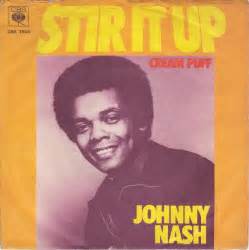
"Stir It Up" is a song composed by Bob Marley in 1967 and first recorded by the group Bob Marley and the Wailers that year and issued as a single. It was later covered by American singer Johnny Nash on his 1972 album I Can See Clearly Now. The following year, Marley and the Wailers re-recorded the song for their album Catch a Fire.
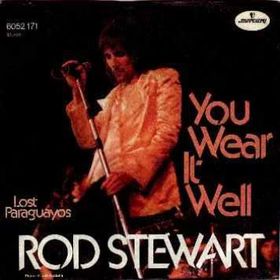
"You Wear It Well" is a song written by Rod Stewart and Martin Quittenton, performed by Stewart. It uses an arrangement markedly similar to that of "Maggie May", one of Stewart's hits from the previous year.

"All I Ever Need Is You" is a popular song written by Jimmy Holiday and Eddie Reeves, and initially recorded by Ray Charles for his 1971 album, Volcanic Action of My Soul. The most well-known version of the song is the hit single by Sonny & Cher which, in 1971, reached No. 7 on the U.S. Billboard Hot 100, and was their single of greatest chart longevity, spending 15 weeks on that chart. Their album by the same title sold over 500,000 copies reaching RIAA gold status.
"Young Love" is a popular song, written by Ric Cartey and Carole Joyner, and published in 1956. The original version was recorded by Ric Cartey with the Jiva-Tones on November 24, 1956. It was released in 1956 by Stars Records as catalog number 539 and one month later by RCA Records as catalog number 47-6751. Cartey's version never charted.

"Montego Bay" is a song co-written and performed by Bobby Bloom about the city in Jamaica of the same name. The song was a Top 10 hit for Bloom in the Fall of 1970 on both sides of the Atlantic. It reached #3 on the UK Singles Chart, #5 on the Canadian RPM 100 Singles Chart, #7 on the Australian Go-Set Singles Chart and #8 on the US Billboard Hot 100. The song was co-written and produced by Jeff Barry. In the master tape of the song, Bloom breaks into a chorus of "Oh, What a Beautiful Mornin'" at the end of the recording. The song features a whistler, as well as Jamaican instruments in a calypso style.

"Who Loves You" is the title song of a 1975 album by The Four Seasons. It was composed by Bob Gaudio and Judy Parker and produced by Gaudio. It reached number 3 on the Billboard Hot 100 in November 1975.
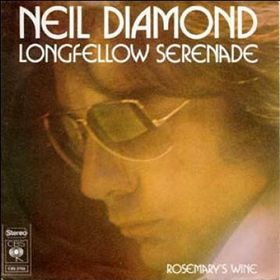
"Longfellow Serenade" is the title of a 1974 song by the American singer-songwriter Neil Diamond. It was written by Diamond, produced by Tom Catalano, and included on Diamond's album Serenade.
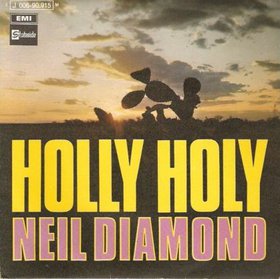
"Holly Holy" is a song written and recorded by Neil Diamond with instrumental backing provided by the American Sound Studio house band in Memphis. Released as a single on October 13, 1969, it was a successful follow-on to "Sweet Caroline", reaching #6 on the U.S. pop singles chart by December. The song also reached #5 on the Easy Listening chart. It became a gold record and then eventually a platinum record.
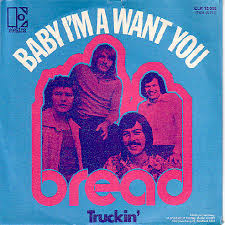
"Baby I'm-a Want You" is a popular song by the American soft rock band Bread. The single was released in October 1971. It became the title track for the album of the same name, released in January 1972.

"The Beach Boys Medley" is a single containing a medley of popular Beach Boys songs from the 1960s, edited by John Palladino. Released in mid-1981, it capitalized on a medley craze begun by the Stars on 45 medleys. "The Beach Boys Medley" reached number 12 on the Billboard Hot 100, becoming the band's highest-charting hit in the United States in over five years. The single peaked at number 8 on the Cash Box sales chart. It also reached number 4 in New Zealand. "The Beach Boys Medley" was first released on an album a year later in 1982 on Sunshine Dream.
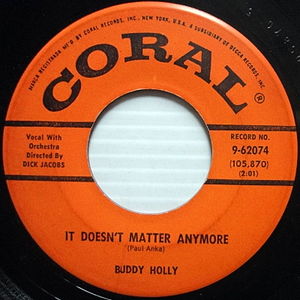
"It Doesn't Matter Anymore" is a pop ballad written by Paul Anka and recorded by Buddy Holly in 1958. The song was issued in January 1959, less than a month before Holly's death. "It Doesn't Matter Anymore" reached number 13 as a posthumous hit on the Billboard Hot 100 chart in early 1959, shortly after Holly was killed in a plane crash on February 3, 1959. The single was a two-sided hit, backed with "Raining in My Heart". "It Doesn't Matter Anymore" was Holly's last US Top 20 hit and featured the orchestral backing of Dick Jacobs. It was also successful in the United Kingdom, where it became the country's first posthumous number 1 hit.
"Daddy's Home" is a famous song by American doo-wop group Shep and the Limelites. The song was written by the three members of the band, James "Shep" Sheppard (1935–1970), Clarence Bassett (1936–2005) and Charles Baskerville. The group recorded the original version of "Daddy's Home" on February 1, 1961, and it was released on Hull Records in March 1961 with the B-side being "This I Know".

"Joy" is a 1971 instrumental pop hit record by Apollo 100. It is a contemporary rendition of a 1723 composition by Johann Sebastian Bach entitled "Jesu, Joy of Man's Desiring", shortened to simply "Joy".

"Never Ending Song of Love" is a song written by Delaney Bramlett, and, according to some sources, by his wife Bonnie Bramlett. It was originally recorded with their band, Delaney & Bonnie & Friends, in 1971 on the album Motel Shot. Released as a single by Atco Records the same year, "Never Ending Song of Love" became Delaney & Bonnie's greatest hit on the pop charts, reaching a peak of #13 on the Billboard Hot 100 and number eight Easy Listening. It reached #16 in Australia.

"Really Wanna Know You" is a 1981 song by Gary Wright that was a hit single in the U.S., reaching No. 16 on the Billboard Hot 100. It was taken from the album The Right Place. The song spent 17 weeks on the chart and became Wright's third biggest U.S. hit. It was his final charting single.

"Rock and Roll " is a 1973 song written and originally performed by Australian singer Kevin Johnson, most famously covered by American singer Mac Davis.

"Summer " is a song by American singer Bobby Goldsboro, recorded for his album of the same name and released as a single in June 1973. It was written by Bobby Goldsboro, Ashley Abram and Timmy Tappan, and produced by Goldsboro and Bob Montgomery.

"Melanie Makes Me Smile" is a 1970 song written by Barry Mason and Tony Macaulay. It became a top 10 hit in Australia in early 1970 by the Strangers.

















